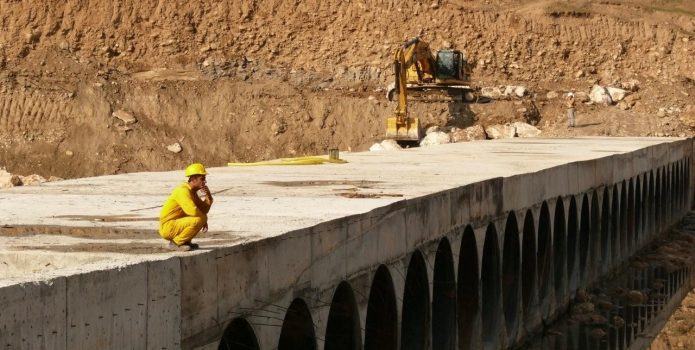Water Shortage Crisis Escalating Between Turkey, Iraq and Syria
“The Tigris and Euphrates Rivers, originating in Turkey and flowing downstream over the borders of Syria and Iraq have become a major issue which impacts on diplomatic relations between the three states. However, the people of Iraq have been harmed the most due to the water policies, since parts of the rivers in Iraq have been facing a drastic reduction in the water flows in recent years,” writes Ercan Ayboğa for Yeni Özgür Politika.
Even though irrigation and energy projects of Turkey are still not fully completed in the Euphrates basin, there is already a 40 percent cut in water flows into Syria and Iraq.
Historically after the establishment of the Turkish Republic, these rivers became a shared resource with the potential for conflict among the states; Turkey, Syria and Iraq. Over the decades widespread controversial construction of dams and large irrigation systems have steadily worsened the water crisis.
Following Turkey’s increased use of river waters, the waterflow in the the other areas of both the Tigris and Euphrates Rivers has significantly reduced.
Turkey’s projects have resulted in drought in Iraq
The tension between the three countries escalate due to the construction of dams and large irrigation systems by Turkey and Iran, which has resulted in water cuts in the region. Droughts in the Iraq region in recent years has increased and the Iraqi people are increasingly suffering from it.
Climate change also has the potential effect of a permanent decrease in rainfall, that can result in possible major conflicts in the future.
Turkey’s projects result in drought in Iraq; Southeastern Anatolia Project (GAP), the unfinished irrigation and hydroelectric projects and mega dam project such as “Ilısu Dam” in the country have resulted in serious shortages of water resources and has had a direct impact in Iraq.
In 1987, Turkey and Syria came to an agreement over water sharing. Turkey agreed to maintain a minimum flow of 500 cubic metres a second into Syria. Iraq and Syria also established a water sharing agreement in 1990, but there is still no significant agreement between Iraq and Turkey that creates a tension regarding water sharing policies in the region.
Possible agreement between Turkey and Syria?
Although cooperation efforts were made in the 2000s, these have yet to result in a formal agreement over water management.
At the end of 2000, expert teams regularly met with the authorities from Turkey, Syria and Iraq, but practically nothing has changed. When the war began in Syria in 2011, Turkey decided to halt the negotiations.
In the following years, with the defeat of ISIS, Iraq has been trying to improve its relations with Turkey, especially since 2016.
Iraq withdrew all its objections against the Ilısu Dam which was built in Turkey and caused a massive area to be submerged under the dam water. (Including the historic town Hasankeyf)
Rojava is mainly affected with water shortages because Turkey still reduces the water flow every year. Critically, the Syrian government ignores or fails to take responsibility for the resolution of these water issues.
Water negotiations between the Turkish Republic and Iraq are part of wider negotiations. Turkey did not cut the amount of water it will leave to Iraq from the Ilısu Dam completed in 2020, as it did to Syria.
In return, Turkey imposes some actions with secret negotiations. Turkey asked for cooperation on the issue of Kurdish movement in Syrian territory and to remain silent in the military attacks on Southern Kurdistan.
There are also economic interests; Turkish companies receiving benefit from investment projects in construction, and other fields in the Iraqi market for Turkish products.
The memorandum of understanding signed with initials between Iraq and Turkey in the field of water in 2019. It was the first sign of the memorandum between the two states on the issue of water in recent years. As the economic interests and technical cooperation are at the forefront, none of the agreements guarantee the peoples living around the river basins a fair share of the waters.
The two governments keep it secret and have taken the approach to pass it in parliaments in secret.
However, we can guess that both parliaments withdrew the bills at the last minute, because they could not fully agree on the details. The issues of access to water is likely to become more critical in the future due to the lack of international agreement in which deepens the crisis over water management in the region.




